FIA Team Principals press conference – Brazil
Andrea Stella, Alan Permane and James Vowles face the press ahead of the 2025 Sao Paulo Grand Prix.
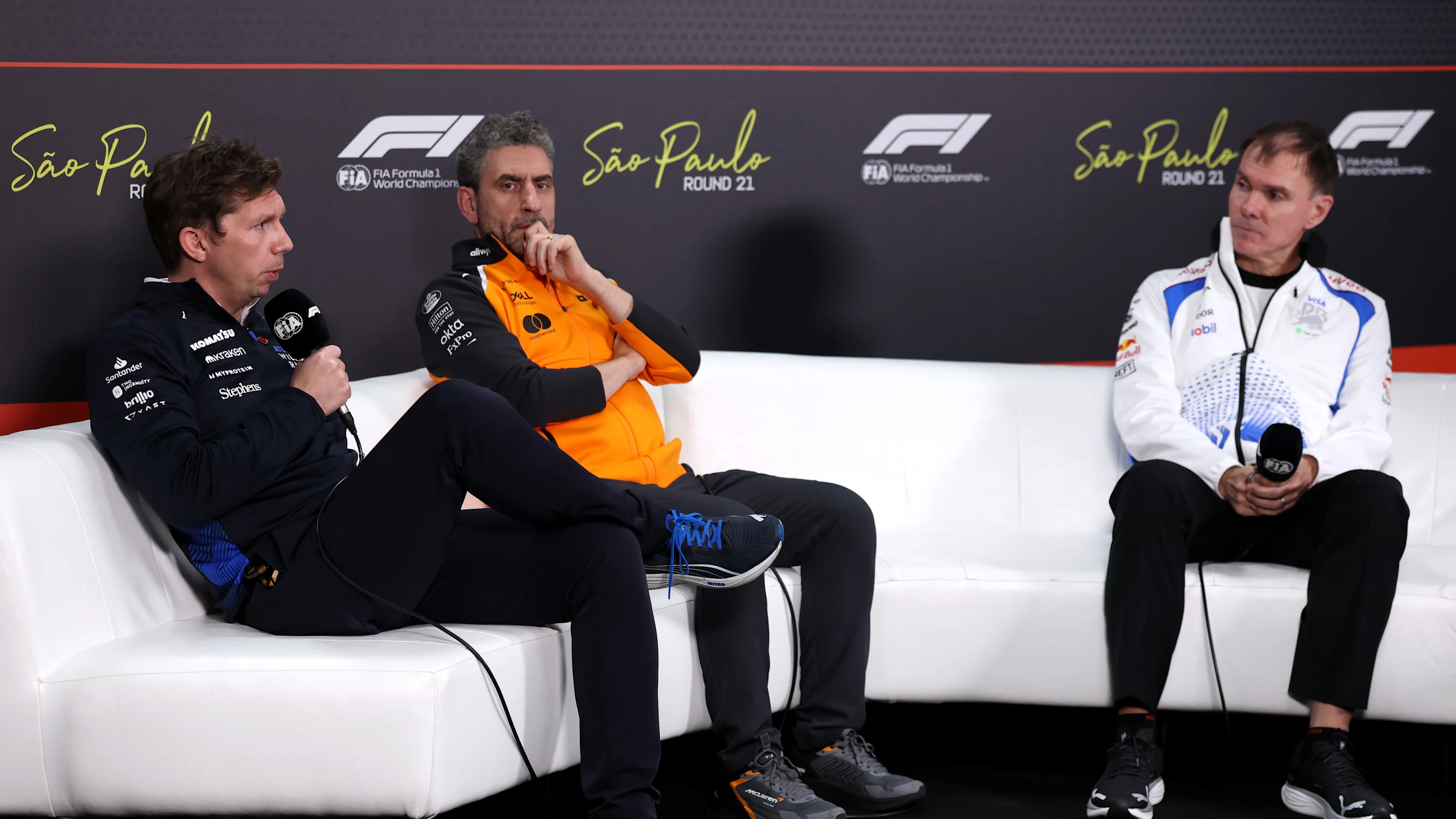
TEAM REPRESENTATIVES James VOWLES (Williams), Andrea STELLA (McLaren), Alan PERMANE (Racing Bulls)
Q: I'd like to start with a question to all of you. We're racing at a very historic track, Interlagos. All three of you have been coming here for many years. I'd like to ask each of you to rate the challenge of Interlagos and just for a memory as well. James, why don't we start with you?
James VOWLES: The Challenge, so obviously, anti-clockwise, so a lot different for the drivers, works the neck in a different way. Sprint race weekend. And you saw last year how difficult and complicated it was. I think I lost count of how many times we repaired a car, if I’m transparent. But I like it because you have real races here, and the conditions really are fantastic, but they create a challenge. But that's the whole point. And my memory would be back in 2009. This is where we won the championship, and it was a really special moment for me here.
Q: Thank you. Andrea?
Andreas STELLA: Yeah. The challenge definitely associated to the fact that you have great racing, and the weather doesn't help the teams in having quiet weekends, but definitely it helps the spectacle. So it's a venue that often offers great racing. The memory goes back to 2007 when we won the championship with Kimi here. Kimi was actually third at the last race in the classification. He was the underdog, and then we managed to win the championship. And we needed to wait, I think, four hours to have the result actually confirmed. So it was a long wait, but with a very good outcome at the end.
Q: Thank you. Alan?
Alan PERMANE: Yeah. On the challenge, I think it's such a short track, so it's very close on lap times. And this year in the fight we're in, the battle of the midfield guys is ever so close. So that'll be a real test this afternoon and tomorrow afternoon, of course, in qualifying. Memory – I think I can trump both these guys. I came here 1990 was the first time I came here. It was either the first or the second race I've ever done. Lots of good memories over the years. I think Fernando won both his championships here, back in 2005, 2006. So yeah, I've been here a few times.
Q: Thanks all. Andrea, let's come back to you. So, four race weekends to go, just the one point between your two drivers. How would you describe the mood in the camp?
AS: Well, the mood is certainly very positive. We are very excited to be in this strong position in the Drivers’ championship. We have, I think, what is needed. We have all the conditions. We have a fast car, two fast drivers, a team that is prepared, determined. And also, we are very excited by the idea that we could be the one that are attempting to kind of stop Verstappen's dominance. You know, we're talking about the champion for the last four races (sic). So for us, it's just – we feel the sense of a privilege to be in this position, and we definitely will keep the fight going until the last corner in Abu Dhabi.
Q: As the races count down, do you feel any tension between your guys? Do you feel them tensing up? It's all about sort of peaking at the right moment, isn't it?
AS: Well, in reality, I don't think that's the case. Obviously, both drivers have known for a long time that the car was competitive, so they knew that there was a possibility to fight for the championship. But I don't see that this is escalating in anything more than focusing each of them on their own weekend and trying to extract the maximum. We talk a lot with the team. Obviously, this requires a high level of dialogue, but this is something that normally we can do well at McLaren.
Q: The car was very competitive last time out in Mexico. FP1 here in Brazil seems to have gone well. Are you confident that you can have that same level of dominance here?
AS: Brazil, I think together with Qatar, probably is one of the races that we expected in dry conditions at least to suit the characteristics of our car. There are long corners, not much braking, the trajectory is not prescribed in the corners, which are the conditions in which the MCL39 seems to express the best. So in Free Practice 1, we have seen that this expectation is confirmed. But like I said before, there's a lot of variability, for instance in the weather. So it's not only about the pace in the car it will also be about execution and operations.
Q: Oscar, he didn't have the pace of Lando last time out. Are you confident that he can bounce back here?
AS: Well, I think Oscar has already provided the answers to this question in Free Practice 1. Today, pretty much every time he was setting a lap time, it was the fastest in the session. He's confident. His comments in the car, his comments in the debrief go back to the comments where he feels the car. He is in tune with the car, and he feels that what he's doing generates lap time in a very natural way. This wasn't the case in the last two races, but in the last two races, the conditions from a grip point of view and the way the car needed to be driven was quite unnatural to Oscar. Actually, he learned pretty rapidly, and it's been a bit of a shame that he couldn't show the pace in the race because he was blocked in traffic pretty much all the race during the Mexican Grand Prix. So I think we have a very strong Oscar here, and hopefully we'll be able to confirm this throughout the weekend.
Q: Andrea, thank you for that. Alan, let's come to you now. We haven't seen your cars in the points since Azerbaijan, your longest pointless streak of the season so far. Sorry to remind you of that. Have there been any specific issues with the car or has it been circuit-specific? What can you tell us?
AP: There's nothing that we can put our finger on that’s a trend or that we believe we've done wrong or something consistently across all the tracks. Every time we look at things – we had an issue with the car in the Singapore Grand Prix, otherwise Yuki would have certainly been in the points. He put it in the wall in qualifying in Austin. Mexico, we felt we didn't quite get on top of the car, didn't quite get the right set-up. So there's little things. And as I said before, it's because it's so close, if you miss a tenth, a tenth and a half, you're the wrong side of that midfield group. And it's very difficult to recover then in the race.
Q: What about here? Do you think you can bounce back?
AP: Yeah. We had a very decent FP1. Drivers are happy with the car. It's tough on rookies in a Sprint weekend – an hour to get on top of things. But it looks decent. I think we were both, maybe, ninth and 11th, something like that. And like I say, it's ever so close. So we need to just make sure we put it right where it counts this afternoon.
Q: You touched on the Constructors' Championship a little bit earlier. Where is your focus over these remaining races? Is it all about trying to seal P6, or are you going all out to try and catch Williams in P5?
AP: I don't think the two… the two are the same. Honestly, what we're trying to focus on is just perfect weekends, without trying to worry about, “This is the points gap” or “That's the points gap” or looking over our shoulders or anything like that. We're just focusing on our car, delivering the best setup we can, the drivers delivering the best they can. And if we do that, I'm sure the points will come. And actually, we can't ask for any more than that. If we think we've executed everything perfectly, then that's all we can do.
Q: Alan, thank you for that. James, come to you now. A frustrating doubleheader for you guys in Austin and Mexico. Are you more confident coming here that you can turn things around?
JV: I'd say more bittersweet because in Austin we still got nine points on the Saturday. But you're right – from Sunday onwards, yeah, it's pretty much been disappointing. Mainly because in the case of Carlos, that was a genuine seventh he was fighting for. And that accident not only cost us in Austin but also went on to cost us in Mexico at the same time. With Mexico – just a comedy of disasters on pit limiters as it turns out, but a lot of learning there. And then with Alex, I spoke about this in a different forum, but it's not really set-up, it's how the tools and set-up combine. We as a team need to do a better job, which is what we're focused on this weekend. And I think Alan said it perfectly – we're now in a fight that, I think in the session, it was a second separating 18 cars. And at times, I think it was 90 milliseconds separating about four of us. You're now into that minutiae detail where everything adds up. And the reality is, with a slightly inconsistent car to a driver, it's very easy to leave a tenth on the table.
Q: You're 39 points clear of Racing Bulls. Do you feel that’s enough? Do you have enough of a buffer?
JV: Short answer, no. It's an incredibly competitive midfield, and you can see already with the podiums that have taken place this year – be it from Sauber, from us – it's a situation where it's very difficult to predict what could happen in any one given race. Now, let’s take tomorrow – I think weather's going to play a part in this weekend, and last year showed us that Alpine – brilliant to them – did a fantastic job and really changed the points table. So no, not at all. I think it's game on to the end of the year. We've got two sprint race weekends, and our job simply in all of this is to prove to the world that we deserve to be fifth.
QUESTIONS FROM THE FLOOR
Q: (Nigel Chiu – Sky Sports) Andrea, you mentioned to Tom before that no tension has kind of escalated recently, but as the championship battle is so close and recent history has shown that teammates fighting for a title can get tense, do you expect there are going to be some flashpoints in the final four races, off the track and perhaps on it?
AS: Well, you refer to the history of Formula 1 and the history of Formula 1 is certainly a source that we've been using to make sure that we have calibrated over time how to approach managing two number one drivers that are in contention for a World Driver's championship. Lando, Oscar, the team have done very well so far. I am personally very proud of our two drivers, our engineers. They collaborate in a way I think that we have not seen before in the history of Formula 1. We are not naive. We know that the pressure is high. We know that the stake is big, but we will continue leaning on our framework, on our principles, on the good conversations. And so far, what I've seen is that Lando and Oscar have always been very supportive. Yesterday, Oscar talked very clearly about the respect – the mutual respect, the mutual support that is happening between himself and the team and likewise is happening with Lando. So we are in a strong position. We are not naive, but we will work very hard to make sure that this position stays until the end of the championship.
Q: (Maria Clara Castro – Car Magazine Brazil) Question to all three, if that's okay. Next year, we have new regulation, and we know all that it can go either way – either good or bad. I'd like to hear from you. What about, if you could elaborate on your role in that and how key is people management?
JV: Right. So, I mean, our role in that is that fundamentally we're working hand in hand – the teams are working hand in hand with the FIA – in making sure that the regulations we have next year are constructive, working in the right direction of travel, and a racing series that I think you all will enjoy and are proud of. And that work takes place – when I say daily, I really do mean daily – and has been taking place daily for at least twelve months now. So that’s part of our role. The second part of our role is how we allocate resource within our team to fight in the current championship and in future championships. And it's always a battle. You always want to be ahead of your competitors in both years, but the reality behind it is you can't have that. So it's about how you distribute and direct your team in that regard. In terms of where I think we're going – I think I've said this in a different forum – I think next year is going to present some very difficult challenges, but it’ll be really interesting to see how teams take those on and how the racing will probably be slightly different to what you're used to today. But I don't think it will be worse – it'll just be very different ways of overtaking and constructing it. So I think as a global summary, that's pretty much my view on it.
AS: Yep. Completely new chassis regulations, tyre regulations, power unit regulations – big challenge. In terms of making sure that Formula 1 in general has a good product to retain the good spectacle that we are having, I'm happy that the conversations are happening and we keep tuning what needs to be tuned to make sure that – and I would say, especially from a power unit point of view – we are in condition to have good racing. When it comes to managing a team that is facing this challenge for the future, like James was saying before, it's been a little bit of a juggle as to how you allocate the resources. But for a long time, at McLaren, we are now fully focused on 2026 from a design point of view because it's a remarkable undertaking, and you need to allocate all the resources.
AP: Yeah. I think the only thing I would add is – the other part of the team principal's job is yes, deciding where the '25–'26 split is, but also ensuring all those people you've got in the factories – and we all have huge factories and many staff – making sure they're fully supported and they have everything they need to do the jobs that they need to do to extract the maximum amount of performance from the chassis next year.
Q: (Gabriel Araújo - Reuters) Question for James. Alpine just announced today that they are maintaining Franco Colapinto for next year. You were his boss. You've kept the long-term interest in Franco. How do you react to this announcement, and what do you see for Colapinto's future?
JV: Yeah. I'm really proud of what he's done – certainly over the last, let's say, seven races. It’s a big turnaround for me. He's showing the world the performance I saw when he was with Williams. I think he's earned that seat for next year, and I was incredibly proud of him when they announced it today. He's got such a huge following. On the way in here – and I'm really not exaggerating – it took half an hour because there's about 50,000 incredibly passionate Argentinians. And that’s what I like to see. The sport is in a health it’s never been in before, and Franco has this huge following. So I think he's done it on performance. He also does it on what the sport's getting out of it as well at the same time. So I think he's got a bright future. It's for him to keep earning it year on year.
Q: (Jon Noble – The Race) To all three of you. There's some debate coming up in the F1 Commission about potential ways to move F1 away from one-stops. You know, is it needed, and can it be done through regulations? What do you think about what the right approach should be for tyres, and what would be the best way of delivering a spectacle to move us away from the one-stops?
AP: Yeah. I think everyone likes two stops or more, but we have to be careful. So we've got our guys looking at it at the moment – our strategy and tyre guys are looking at it closely. I think one of the things that makes a two-stop race tricky is when the tyres aren’t really suited for two stops. So you need to have tyres that demand the two-stop race. If you force a two-stop, you can end up with everyone doing the same strategy and actually have the opposite effect. And don't forget, we've seen plenty of races with one guy on a one-stop and one guy on a two-stop, and then the guy on a one-stop being chased down by the two-stop – but that will obviously disappear. So I think we need to think very carefully. And we are. And I'm sure the F1 Commission will debate it, and I'm sure we'll come to the right answer.
AS: I agree with Alan. I think the tyres remain the fundamental factor to have some variability in the race. And in particular, whenever there's some degradation, I think we can see overtaking and pit stops. At the same time, for 2026 – like we said before – we have so much change going on, and I think we should observe also what kind of racing we are going to have before we change the technical side and also the rules of the game. So I would invoke a little bit of prudence from this point of view. Let's observe what happens in 2026, and then we can adapt from a sporting point of view to make sure that the entertainment and the racing is at the right level.
JV: I think just to take the good work that was done here already – but my biggest worry would be that we end up, all of us, doing the same strategy to within a lap of each other because you're forced that way because of the two stops. So, to the key point, let's get the key foundations right, which is tyre degradation and the gaps between the tyres. And I don't mind a forced rule then that puts us in that circumstance, but I have a worry that immediately where we are now – I think you'll get less variability in next year's races, and that concerns me.
Q: (Gabriel Alberto – Band) Question to Alan. Alan, today we saw the announcement of Franco Colapinto, and with that, there are only three seats remaining for next year — two in your team. I want to ask you if the new regulations are a factor in why you haven’t decided the line-up for next year?
AP: No. Not at all. It's nothing to do with the new regulations. We are in a very tight battle ourselves, as we talked about. But also, Red Bull are in a very tight battle in their Constructors' Championship, and we just want to have some stability. And that may well go on right until the end of the season. So you may not find out until Monday morning after Abu Dhabi. I don't know exactly when it’ll be, but that’s the reason. It's nothing to do with next year's rules.
Q: With regards to next year's rules, Alan, how important will experience be on the driving front?
AP: I think it's always important. You always want the experienced driver. We see with James and his two super experienced drivers – they hit the ground running pretty much every weekend. And that’s not to take anything away from our guys, but experience always counts. Nothing beats pace, obviously. So you have to have that pace there. It will undoubtedly help for next year. On the other hand, you could look at it and say, well, everyone’s starting from a clean sheet of paper. No one has experienced these regulations. So I suspect there’ll be a huge amount of simulator work being done – it’s ongoing now – and once the season finishes, that will only ramp up. So yeah, it definitely is important.
Q: (Adam Cooper – Adam Cooper F1) One question for Andrea. You mentioned 2007. There are obvious parallels to be drawn between then and now. What are your memories of that fight and Kimi coming back from 17 old points behind in two races? And did you maybe learn lessons that you can apply this year now that you’re the hunted instead of the hunter?
AS: Like I said before, we always take a look at history. We try to understand what has happened, what are the lessons learned. 2007 – there’s another interesting one, obviously, in 2010 with a different outcome for myself. One we won, one we lost. In both cases, for instance, it was the driver that was third in the classification at the last race that actually won the championship. And this is an easy lesson that we see in every kind of sport – never give up and never give anything for granted, which is very important. When we look back at 2007, obviously, we know that there's been quite a lot of internal competition at McLaren. I was on the other side. Potentially, that competition went a little too far, and we could say that racing led the victory to the third one, of another team. Once again, this is a conversation we are having internally right now. We are having conversations with Lando, with Oscar: let’s make sure that the winner drives a papaya car, OK? There's a bigger interest for the team – and even for yourself – because we look at the future as well, not only the present. Let's make sure that we collaborate as much as is sensible to do so between two drivers to make sure that the title is a papaya overall, and a papaya car.
So there's definitely a lot to pick from those days. And there's also something that you pick in terms of the determination and the resilience that you need to have in this business. Because nowadays, the season is 24 races. At that time… Here we are in race 21, then everyone would be on holidays already, and here we are – still four events to go with one point separating the two drivers. So the amount of resilience that is needed nowadays is certainly something that you better have and practise a bit over time. Our drivers are relatively young, but we talk about resilience and managing fatigue as well.
Q: (Jake Boxall-Legge - Autosport) A question for all three of you this time, please. Andrea, you mentioned the resilience that the drivers need, but I guess this extends to the teams as well. So what I want to know is: we’re coming into the final three races after this one, criss-crossing a lot of different time zones – how are you managing the team and everything like that? I guess it’s very, very difficult to keep everybody fresh and eliminate human error and things like that?
AS: Well, it’s an important question. It’s a question that you need to make yourself as a team principal and then as a leadership group. Because while we look at the technical side, the operational side, there's also the human factor. And managing fatigue is an important one. Recovery between one race and the other is an important one. And over the years, we have made sure that there were investments on this aspect at McLaren in terms of the staff that support from a medical, physiotherapeutic, psychological – anything that is related to wellbeing and human performance – the race team and even the factory team. We have invested in the way we travel, the accommodation – to make sure that our people are in condition to perform at the best of their potential. Ultimately, it could be a human element that makes the difference. So we want to make sure that we are at the top even in that respect.
JV: Beautifully summarised. This isn’t new to us. We’ve been doing 24 races for a while, and there is a cadence that you need with exactly that – you need medical support, you need physio, you need sleep patterns, you need rest time for the individuals. And so you don’t get here by chance. You get here by a structured programme that leads them there. But what I urge you to do is go in the pit lane, for example, tonight or tomorrow night, and you’ll see – certainly in the case of Williams, but it’s not just us – the mechanics are effectively out there, the pit stop crew are out there doing warm-up exercises and otherwise. In other words, they’re using that moment to keep building on their foundations going forward because that strength is what carries them through. So it’s a different world to what it was five years ago in that regard. I think you see it within a team when fatigue creeps in because small errors will creep in as well. It’s still a sport that’s reliant on humans performing at a very high level. And you just need to keep – as you do with sort of health and safety – you look for the early warning signs and just make sure you catch a point and do corrective action.
AP: Nothing major to add. Like these guys, we carry a doctor, a physio, and the guys are encouraged – guys and girls – are encouraged to keep fit. You see many of them running the track or in the hotel gyms. We make sure, as Andreas said, we’re in a decent level of hotel with good facilities so that they can keep fit. We will definitely try and give each and every one time off between races – which is tricky between that last triple-header. Even then, it’s possible to get a day off and have a day of downtime, and I think that can make all the difference.
Q: (Jon Noble – The Race) To Andrea. You’ve talked a lot about how you work really hard to get fairness across the cars and keep a lid on the rivalry bubbling up. But personally, how hard has it been for you to manage this – deal with the flashpoints? And how do you react when, after a race, social media explodes and says you're favouring one driver over the other and it bounces around between the two?
AS: First of all, I’m kind of – so far, I’ve been lucky enough that we haven’t had many flashpoints at all. And I think this is, like I said before, thanks to the fact that we have Lando and Oscar on board, and we invested a lot right from day one with Lando and then day one with Oscar, on setting up the relationship based on the concept of fairness, equality, sportsmanship, and so on. And this is always the angle that we take, that we adopt in our conversations. Definitely, for me as well, it has been a journey in terms of understanding all the subtleties that you need to take into account while managing this kind of mission – which is to preserve the way we go racing while letting them race, which is what we are trying to do – and kind of embracing the difficulties that come with that. I’ve always tried to look at the facts. I focus on the facts. I talk about the facts. Facts are the foundation of all the conversations I have – including with the drivers. And we try to make sure that what is noise is very well distinguished from what is factual. And there’s a lot of noise. Formula 1 is a very popular sport. We all like to talk about sport. I do like to talk about football, and I become the best manager in the world at football. So I know that this is normal, but it’s important that you extract what is factual and you keep everyone focused on the facts.
Next Up
Related Articles
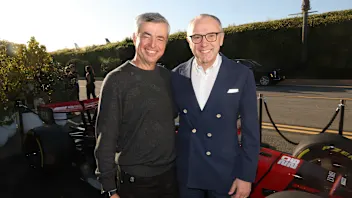 Stefano Domenicali attends Apple TV press day
Stefano Domenicali attends Apple TV press day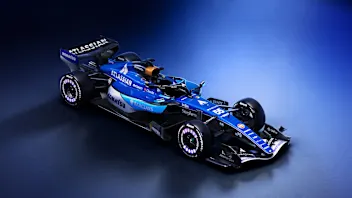 Williams show off their new livery for 2026 F1 season
Williams show off their new livery for 2026 F1 season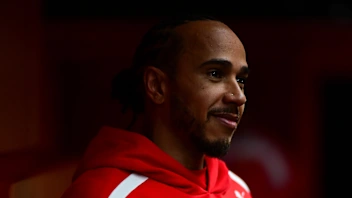 Hamilton feels ‘winning mentality’ at Ferrari ‘more than ever’
Hamilton feels ‘winning mentality’ at Ferrari ‘more than ever’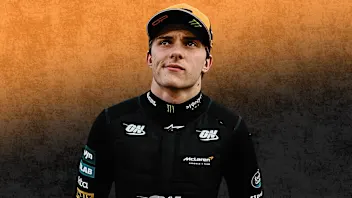 ExclusiveWhy Piastri expects to keep Norris on his toes again
ExclusiveWhy Piastri expects to keep Norris on his toes again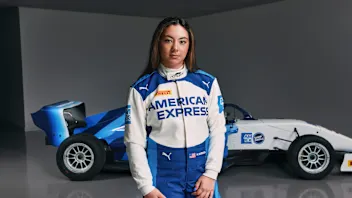 F1 AcademyAmerican Express confirms Dobson for 2026
F1 AcademyAmerican Express confirms Dobson for 2026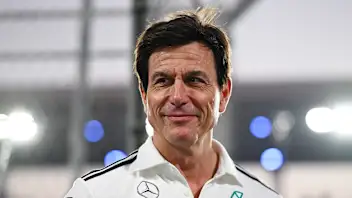 Wolff admits Mercedes ‘simply don’t know’ what rivals can do
Wolff admits Mercedes ‘simply don’t know’ what rivals can do